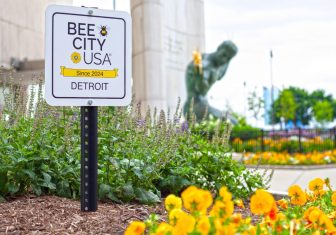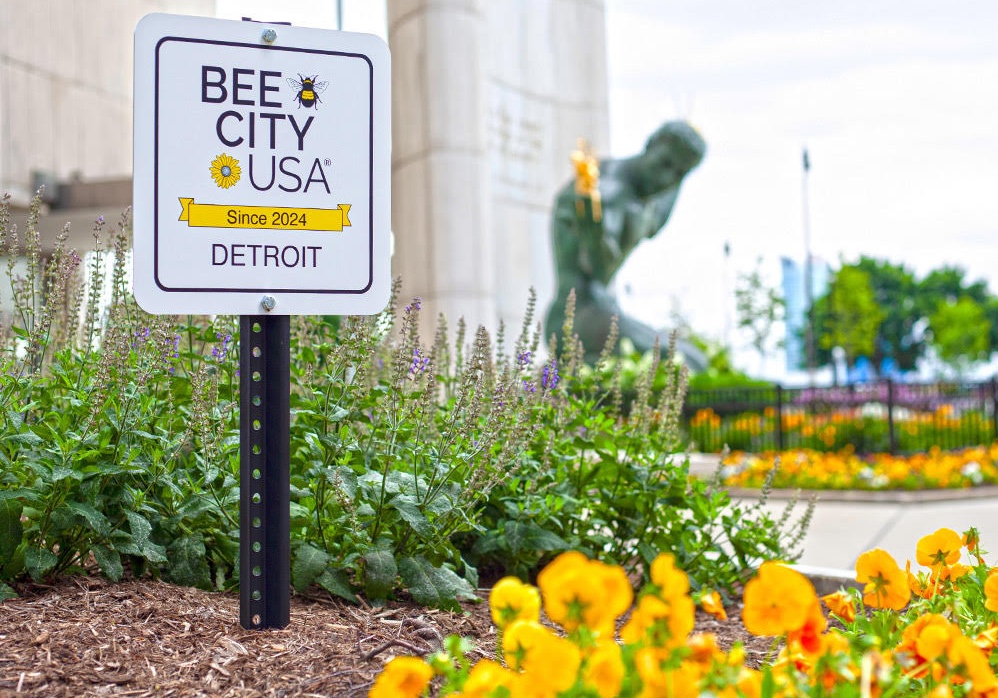By Jada Vasser

Bee City USA sign in downtown Detroit. Photo courtesy
Detroit resident Timothy Paule Jackson’s fascination with bees began in 2016 when he discovered the benefits of honey in fighting colds.
He began researching the components of honey that have medicinal effects on the immune system. Soon after, he and his partner Nicole Lindsay began taking beekeeping courses.
They founded Detroit Hives in 2017 after the couple purchased their first vacant lot in Detroit and began keeping bees on the property.
As Detroit natives, they recognized the potential of beekeeping to transform vacant and blighted properties and bring new energy to underserved communities. Jackson and Lindsey co-lead the nonprofit, which is funded through donations and partnerships with other organizations.
“Our mission is to improve underserved communities for both the people and the pollinators,” Jackson said. “This organization will have social, environmental and financial impacts.”
Jackson said no two days are the same at Detroit Hives.
“It’s really hard to predict what the day will be like, especially during bee season,” Jackson said. “We might be responding to a swarm call or doing a lot of administrative work like answering emails and more hands-on work with volunteers.”
With the support of a $5,000 Climate Implementation Grant from the City of Detroit, Detroit Hives is expanding its work to leverage pollinator habitat to improve food security, revitalize abandoned areas, and promote environmental justice for the city’s Black, low-income communities.
Bees help with seed production, promote biodiversity and maintain healthy soils that sequester carbon and increase resilience to climate change. The project also includes green spaces to absorb rainwater and prevent flooding.
“Stormwater flows into Detroit’s waterways,” Jackson said. “Part of this project is to create a surface where some of the water can drain into the ground.”
Jackson wants both bees and Detroit residents to thrive, and he says that requires conversations to educate people and help them change their attitudes toward bees.
He hopes that more citizens will appreciate the role bee farms play in keeping the city clean.
He said that residents could receive pollinated plants in return for providing food to bees in the planted gardens.
Detroit Hives has 29 locations in Detroit and Southeast Michigan and continues to expand and grow.
Jackson said his organization is working with the city council to become a designated bee city. To become a full-fledged bee city with Bee City USA, cities must have healthy pollinator sites for bees and commit to protecting pollinators and their habitats.
Detroit is a partner country, meaning the city makes commitments to protect bees and community members work together to implement those commitments and make the city better for pollinators.
He said the designation supports “sustainability and conservation, hand in hand with our many green spaces and planned solar projects.”
Detroit Hives also offers tours of mini gardens around the city and partners with local businesses and schools to teach the lifelong importance of bee pollination.
Jada Vasser is completing an environmental reporting internship as part of the MSU Knight Center for Environmental Journalism’s Diversity Reporting Partnership with GLISA/National Oceanographic & Atmospheric Administration. This story was produced for Planet Detroit.

